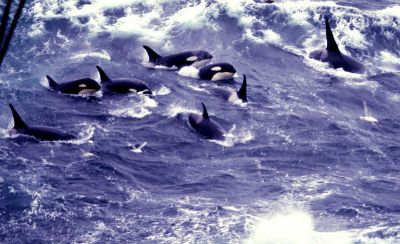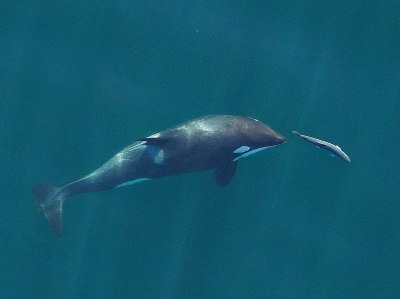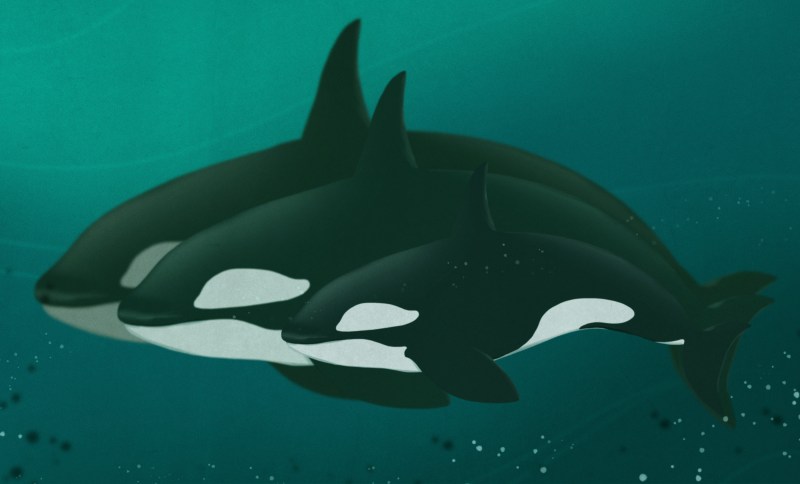Menopause is the time of life when menstrual periods come to a halt, and a woman is no longer able to bear children. The most obvious cause of menopause is when the ovaries run out of eggs, though it can also be caused by a variety of other medical processes. While menopause is in many ways well-understood, the biological reason for menopause, or the way in which it evolved in humanity remains a mystery. The process was once thought to be virtually non-existent in the animal kingdom, raising further questions.
Surprisingly recently, however, scientists began to learn that humans are not alone in this trait. Indeed, a small handful of sea-going mammals also go through this unique and puzzling process.
Life Beyond Reproduction
The vast majority of species in the animal kingdom do not typically experience menopause. These creatures typically die while still capable of reproducing with a mate. Homo sapiens, then, are the outlier; typical human ovaries run out of eggs somewhere between the ages of 48 and 52, in sharp contrast to the worldwide human life expectancy of over 70 years. Indeed, it’s not uncommon for humans to live decades beyond the end of menses.
It was only in the early 1980s that scientists began to learn that humans weren’t completely alone in experiencing menopause. Scientists Helene Marsh and Toshio Kasuya had been working together on studying the reproductive systems of short-finned pilot whales. Having collected samples from 300 animals, Kasuya determined their age from counting growth rings in teeth, much the same way as with trees. Meanwhile, Marsh examined the ovaries. The data showed that most of the whales stopped having children around 36 years old, but that they would commonly live approximately 14 years longer than that on average.
It was the first time scientists had turned up strong evidence that an animal species continued to live beyond its reproductive years. While it was a challenge to the scientific orthodoxy at the time, over the years, more evidence came to light in support of the findings. Since then, scientists have discovered that killer whales, narwhals, and beluga whales experience menopause as well.
The Question of Why
The reasons why menopause occurs still remain a mystery. A variety of competing theories exist to explain the phenomenon, most of which have difficult caveats that complicate the issue beyond a satisfying resolution.

Killer whales live in close-knit social units, working together to hunt and sharing resources. Credit: NOAA, Public Domain
The benefits of modern medicine on human life expectancy are often cited as a potential reason, with the thrust of the argument being that humans were never intended to live so long anyway. However, menopause is still observed even in hunter-gatherer societies without the benefits of such treatments. The various sea-going mammals that also experience menopause only further cast doubt on this seemingly intuitive theory.
The grandmother theory is another explanation, based somewhat on social structures in the way creatures live together. It supposes that menopause came about as it encourages a grandmother to help care for grandchildren rather than continuing to produce more offspring. From an evolutionary perspective, this would allow their genetic material to propagate further into the future in an indirect fashion. However, elephants and some other species counter this theory, with many elderly females both supporting their grandchildren and other young in their clan while also continuing to breed.
A compelling theory put forth from the authors of a further study on killer whales suggests that reproductive competition could be the cause. The study looked at decades of data collected on killer whale breeding, and noticed that the children born to older killer whales was 1.7 times more likely to die than the offspring of the younger whales.
Killer whales stay with the group containing their mother as they age, but mating goes on outside the local group. Thus, as a female whale ages and has more children, the level of relatedness to other members of the group increases with age for female killer whales.

Older killer whale mothers are often adept hunters, who use their skills to help their pod secure enough food to sustain themselves. Credit: Oregon State University, CC-BY-SA-2.0
Mothers in a pod of killer whales compete over food, with a limited amount to go around to support the children. An older mother whale thus has a choice. She can have more children at the same time as the younger mothers breed. However, if there is an excess of children that the pod can’t secure enough food to support, this harms all the pod members she is related to.
Alternatively, she can simply not have more children, and spend more effort in securing food for the whole pod. Given the older mother is more highly related to members of the pod, it’s highly likely that the younger mother’s offspring will be related to her anyway. Thus, it makes sense for her to invest in supporting the younger members of the pod rather than having more children directly, thus creating a potential explanation for the evolution of menopause.
Some research has also noted that older mothers readily share plenty of food with their adult sons. Sons mate outside the pod, so their children propagate the older mother’s genes without taking away resources from her own social unit, potentially harming her other young.
This reproductive competition theory has proven a popular way to explain the rise of menopause in human and whale examples, where the social structure of the group has a strong correlation with how young are raised and how they prosper. Thus, it may be that social structures built around the provisioning and sharing of limited food resources, along with the dynamics of cooperation and conflict between different generations, were the causal reasons that led to the evolution of menopause.
















[b]Whale oil[/b] is thankfully no longer harvested giving us more opportunity to study these fascinating creatures. Though also large [b]beef[/b] cattle apparently do not have menopause, or maybe are culled when birth rate drops. But I thought I had heard something about elephants of some stripe, or as it turns out, ear size, had menopause, so I through out my line and this is what it [b]hooked[/b] https://www.psychologytoday.com/ca/blog/how-we-do-it/202005/massive-mammals-menopause#:~:text=Asian%20elephants%20(left)%20have%20menopause,elephants%20(right)%20do%20not. adding further dimension to the whale data and also including elephant studies.
*threw, dang, why am I halving trouble with homophones sew mooch recently. Also whoops, guess I forgot I wasn’t on top of vBulletin or SimpleMachines
Well it just seems to me that, since pregnancy is metabolically taxing, in species that have a long childhood if a female continued to have children into her old age she could die from pregnancy, not only leaving her dead but possibly several children orphans. Menopause allows a woman to finishing raising the children she has already while avoiding the risks of pregnancy in old(er) age.
Even with modern medicine, the risks of pregnancy both to the child (in the form of illnesses and birth defects) and to the mother (in terms of the hazards of pregnancy and childbirth, which are uniquely harsh for humans) increase dramatically. Since older humans are a valuable resource for knowledge and skill in human cultures, especially the small culture of a tribe, menopause may serve the function of keeping women alive longer so that they can contribute instead of dying in pregnancy or childbirth. While the average lifespan of humans has increased a lot since primitive times, the maximum lifespan if you avoid getting sick or killed by a predator or in an accident or conflict really hasn’t.
I did enjoy the article. It is well written and I am interested in all sorts of science and technical topics so I’m not saying it bothers me at all to see it here. It does make me curious though. So, in the most polite way I can ask… what is the hacking angle on this one?
There is none! It’s a purely neat science writeup. Bonus.
“Killer whales stay with the group containing their mother as they age, but mating goes on outside the local group. Thus, as a female whale ages and has more children, the level of relatedness to other members of the group increases with age for female killer whales.”
Why thus? If mating goes on *outside* the local group, then the level of relatedness would surely *decrease*.
Either I’m not smart enough to parse this or it just doesn’t parse. What am I missing here..?